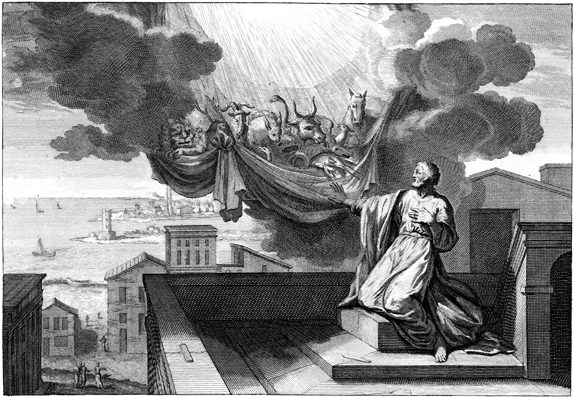I grew up in hunting country where at the appropriate times each year the males of the species took their preferred firearms and started shooting things. I remember my father returning from a day of hunting with a partridge or two or even a squirrel in his backpack (much to my mother’s consternation). Every third year or so he would hit the jackpot and get a deer, setting us up with meat for most of the upcoming winter. My older brother became a fellow hunter with Dad when he reached the appropriate age, but when my time came, problems arose.
I didn’t want to do it. I did not know that principled objections to killing non-human animals were available to me—it just was very clear to me that this was not something I wanted anything to do with. At the time I didn’t have any trouble eating the meat my father and brother brought home; it wasn’t until many years later that I cut red meat out of my diet.
In the book of Acts, we find one of the most game-changing events imaginable, a “kill and eat” scenario with implications far beyond mere dietary preferences. Acts, of course, is about the early Christian communities and the spread of the “good news” inexorably from Palestine toward Rome and beyond. Often lost in the midst of the story is just how disorienting and belief-challenging all of this must have been. Major debates raged about exactly what this new system of beliefs is. Is it a new version of Judaism? If so, then new Christians are subject to the same dietary and behavioral rules from the Pentateuch that all Jews are subject to; male converts, for instance, should be circumcised.
Or is this new set of beliefs something new altogether, perhaps a challenge and direct threat to Judaism? Complicating the issue, at least according to evidence from the gospels, is that Jesus himself was not always clear or consistent about who his message and teaching was for. Jesus was a Jew, and at times clearly said that his message was for the “House of Israel,” while at other times he packaged it for everyone, including non-Jews.
In Acts 10 we find Peter, the man who perhaps knew Jesus best and who, as the alpha disciple, is now at the forefront of spreading the good news, hungry and exhausted after an extended prayer session on the rooftop of a friend’s house in Joppa where he is staying. And then the strangest thing happens, as Peter reports to some critics in the next chapter:

In a trance I saw a vision. There was something like a large sheet coming down from heaven, being lowered by its four corners; and it came close to me. As I looked at it closely I saw four-footed animals, beasts of prey, reptiles, and birds of the air. I also heard a voice saying to me, “Get up, Peter; kill and eat.”
The sheet is full of all sorts of animals that, according to Jewish law, must not be eaten under any circumstances, as Peter immediately recognizes.
But I replied, “By no means, Lord; for nothing profane or unclean has ever entered my mouth.”
Peter knows the rules backwards and forwards; furthermore, he knows that for a Jew, strict obedience to these rules is required in order to be right relationship both with God and with his community.
But as seems to happen so often in the context of what we think we know about God and our relationship with the divine, the rule book is thrown out entirely.
But a second time the voice answered from heaven, “What God has made clean, you must not call profane.”
Imagine Peter’s consternation and confusion. Imagine the consternation and confusion of his fellow Jewish believers when they find out that he has been hanging out with and spreading the good news to Gentiles. For after the voice from heaven in essence tells Peter “You know all of that stuff about what not to eat in order to be in right relationship with God, the stuff that has defined the diet of a faithful Jew for the past couple of millennia? Never mind. You can eat anything you want,” Peter is further informed that the human equivalent of unclean animals—the Gentiles—are now to be recipients of the good news that you might have mistakenly thought was just for Jews.
There’s this Roman centurion by the name of Cornelius who has been asking some really good questions—go to his house and help him out. Subsequent chapters in Acts pick up the theme. Cornelius and his household convert to the message of Christ, start speaking in tongues as Peter and the other disciples did at Pentecost, more conservative Jews are appalled, and eventually there is a big council in Jerusalem to decide what the hell’s going on. But Pandora’s box has been opened never to be closed again. The old rule book is out, and it’s anyone’s guess where this is going to end up.
Don’t you just hate it when someone changes the rules of the game just when you’ve gotten really good at working within the framework of the old rules? Just when you think you have everything relevant and necessary figured out, it all changes. For the past couple of years we have been in the middle of such a time politically in this country. Pundits and talking heads are regularly reduced to “I don’t know” and “beats me” when asked to predict what is likely to happen in the next several months. Public attitudes concerning homosexuality and same-sex marriage have evolved and shifted more quickly than anyone could have foreseen. People are talking about the rights of transgendered people. More millennials are checking “none” when asked about their religious affiliation than check the box for an identifiable religion; these “nones” exhibit little interest and find no home in traditional religious structures. Sheets from heaven filled with female priests, less-than-conservative Popes, LGBTQ persons, Muslims, and every type of person that anyone could possibly be uncomfortable with are being lowered before the eyes of those who thought they knew what they were supposed to think about such things. What’s a person to do?
Sheets from heaven such as Peter experienced provide opportunities for extreme risk—how willing am I to leave all of my preconceptions and frameworks of understanding behind in exchange for growth and change? Peter could have dismissed his experience as merely a result of overwork and hunger. But instead he helped to change the world. We are presented with similar opportunities every day.













